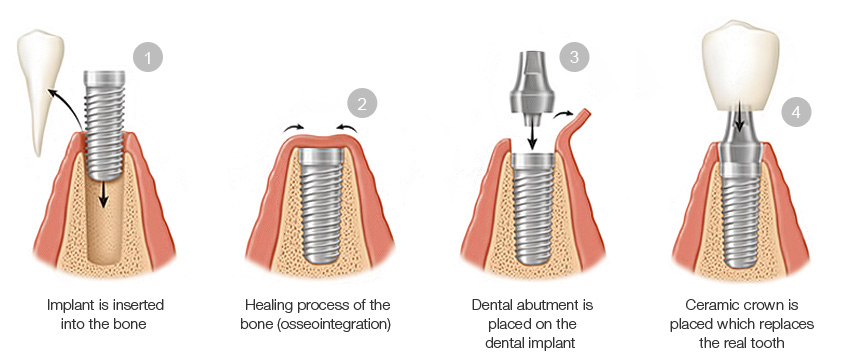Dental implants are an increasingly popular treatment option for patients hoping to replace missing teeth. Implants tend to be crafted from titanium and are inserted surgically by dental specialists such as dentists or oral surgeons.
To ensure secure placement, implants feature screw-like components that fit into the jawbone and effectively imitate a tooth root.
What kind of patients qualify for dental implants?
Generally speaking, patients seeking dental implants will need to have decent oral hygiene and a strong jawbone. They will also, of course, need to be missing one tooth or more, or have a very damaged tooth or teeth.
It is recommended that those receiving dental implants have a good level of general physical health.
How much do implants cost?
The cost of a dental implant depends on a number of factors, including the number of teeth that need replacing, and whether the patient needs additional surgical procedures such as a sinus lift or bone graft.
As a guide, the price of a basic dental implant is likely to cost between $3,000 and $6,000 for each tooth.
How exactly are dental implants inserted?
There are two general phases to dental implant surgery, with the process usually lasting around six to nine months. The first phase, which is largely surgical, will be carried out in a dental office under local anaesthetic.
The first phase
The first phases will occur as follows:
1. The mouth is numbed with the help of local anaesthetic.
2. The dentist will make an incision in the gums, exposing the bone where the implant will be secured.
3. The dentist will use a special drill to make a small space in the bone for the implant to sit.
4. The implant will be securely screwed into place.
5. Once the implant is fitted into place, a second part will be screwed into the new implant to aid the healing process.
6. The dentist will close over the exposed implant with the gums, and a couple of stitches may be used to aid healing.
7. The patient will be required to wait a few months for the implant to become attached securely to the jawbone.
The second phase
The second phase will occur as follows:
1. The dentist will re-expose the implant, making another small incision into the gums.
2. The patient will then have a small extension placed on their implant and the dentist will take an impression of their tooth. With this component, dental technicians will be able to fit the patient with a new crown.
3. The making of a crown will take place during a number of follow-up appointments with a dentist. These appointments will usually involve taking more impressions of the teeth to create an accurate model of the mouth.
4. Once the crown has been made using these precise models, a dentist will finally place the crown in the requisite spot. Sometimes, they will request to test the new crown for a little while before it is completely finished to ensure it fits correctly.

How do patients recover from implant surgery?
Generally speaking, discomfort is relatively minimal with dental implants. Most patients will have a little bruising and swelling of the gum area, but this can easily be treated using everyday painkillers such as ibuprofen or codeine.
How should dental implants be cared for?
Newly implanted teeth should be kept thoroughly clean and checked by a dentist regularly, just like a natural set of teeth. This includes regular brushing and flossing, therefore, and a trip to the dentist at six-month intervals.
What complications may arise from dental implants?
Dental implant surgery carries a few risks, as with any surgical procedure. The greatest risk is that the implant could end up failing due to factors such as teeth grinding and clenching, infection, and problems with bite.
For patients receiving replacements on the lower jaw, there is a small chance that the nerve that sits under the bone will be damaged by the dental drill or, indeed, by the placement phase of the procedure. This can cause a certain amount of discomfort or numbness, but will likely be resolved once the nerve heals. In the rare scenario that the nerve does not heal, there is a chance that this numbness will be permanent.
For those receiving upper jaw implants, there is a risk that the dental drill will break through the upper teeth to the sinuses above, potentially causing infection. Dentists will do X-rays prior to surgery to prevent this from happening, as it will tell them where sinuses and nerves are precisely located.
Generally speaking, it is a very good idea to visit a high-calibre dentist that will be able to provide you with reliable and top quality care. Indeed, poorly fitted dental implants may end up costing you more time and money than anticipated as they will require further dental treatment.
If you’re interested in receiving dental implants, book an appointment with us at our Box Hill dental clinic. Please call (03) 8547 9556 or request an appointment online so one of our friendly team can call back to confirm a time.






